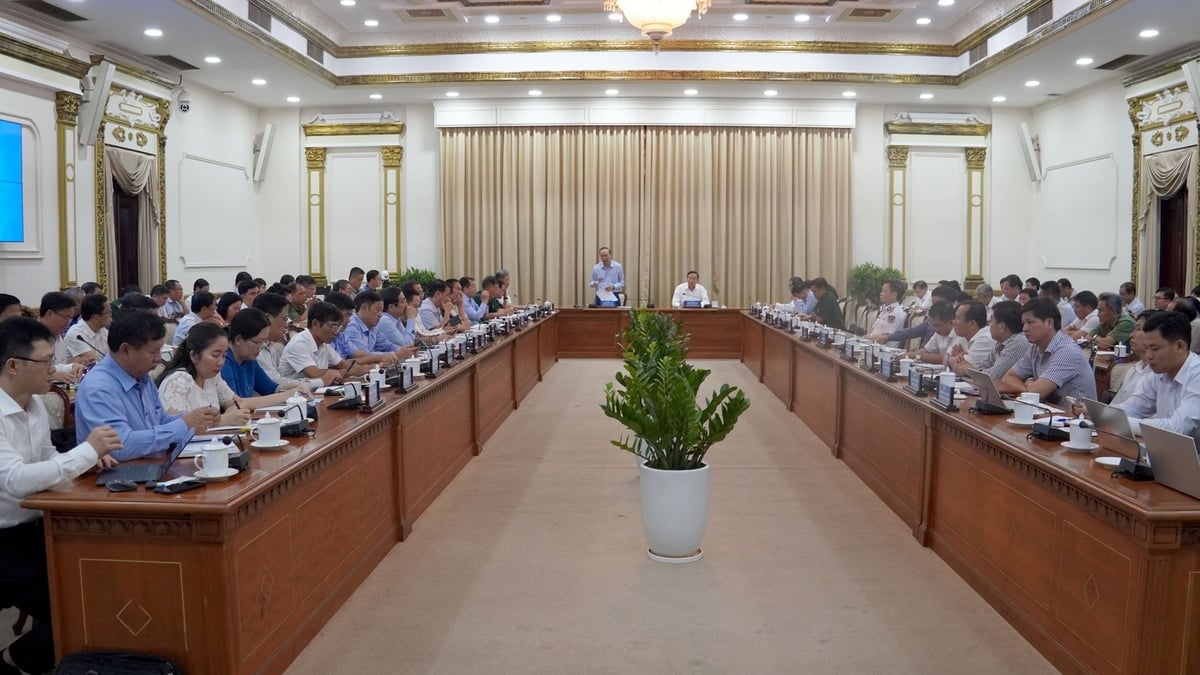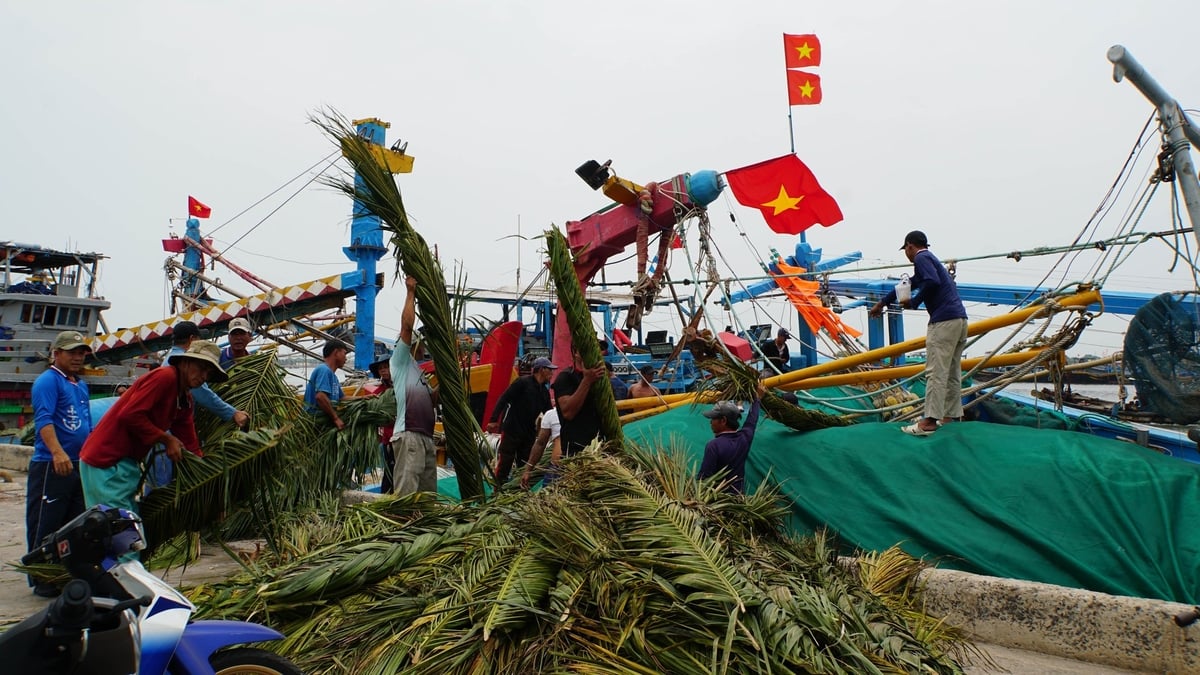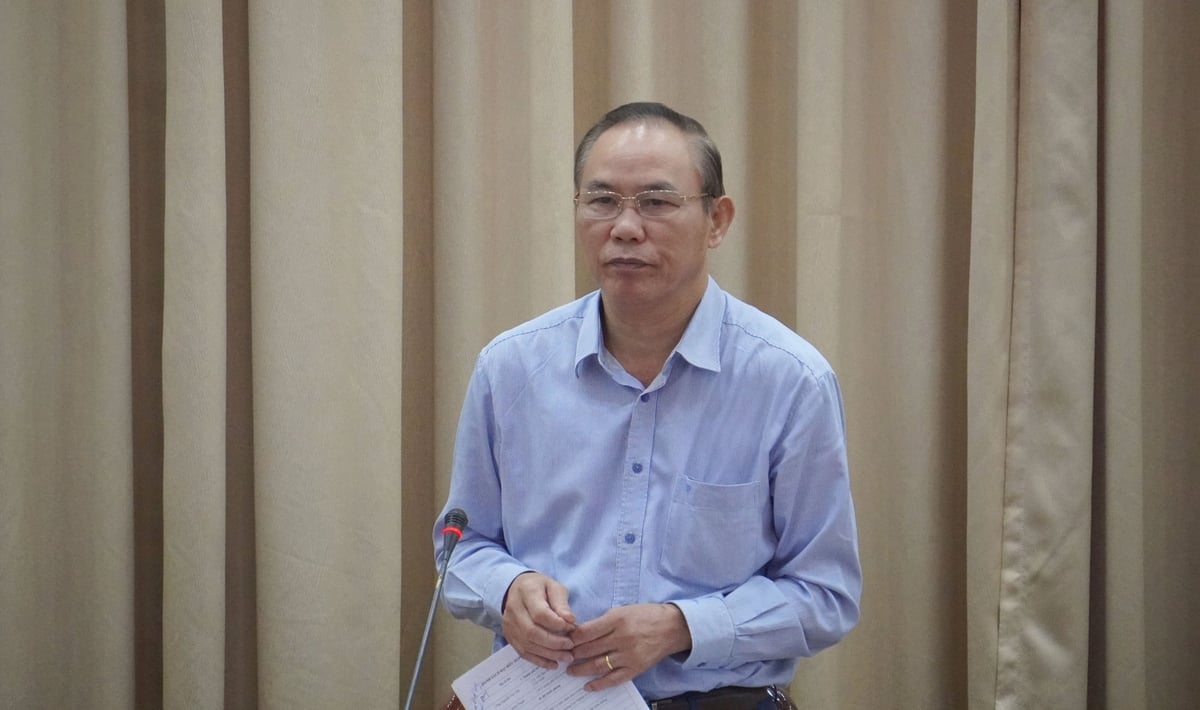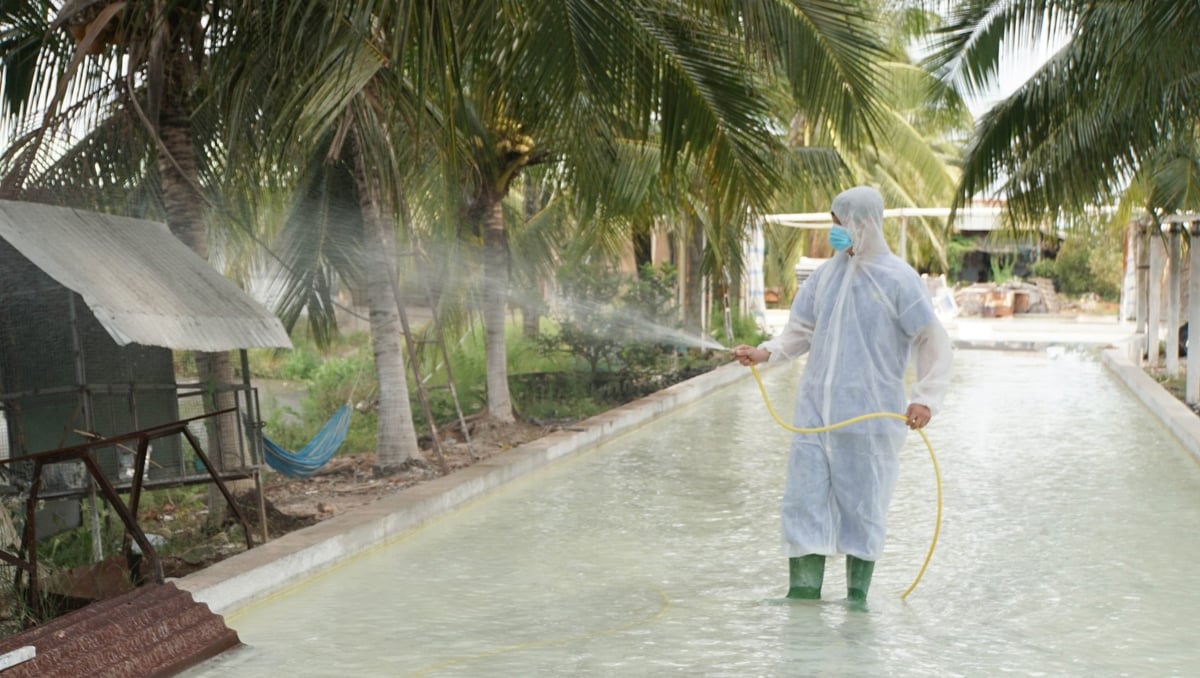November 24, 2025 | 07:11 GMT +7
November 24, 2025 | 07:11 GMT +7
Hotline: 0913.378.918
November 24, 2025 | 07:11 GMT +7
Hotline: 0913.378.918
The Ministry of Agriculture and Environment convened a working session with provinces from Dak Lak to An Giang at the Ho Chi Minh City People's Committee headquarters on the morning of August 16 to address the prevention of animal diseases and illegal, unreported, and unregulated (IUU) fishing. The meeting was co-chaired by Nguyen Van Tho, Standing Vice Chairman of the Ho Chi Minh City People's Committee, and Deputy Minister Phung Duc Tien.

Localities must implement more stringent measures, such as strict vessel management, limiting loss of connection, and preventing boats from encroaching into foreign waters, in order to remove the IUU "yellow card." Photo: Le Binh.
In October 2017, the European Commission (EC) issued a warning to Vietnam regarding illegal, unreported, and unregulated (IUU) fishing. The Government, in collaboration with the Ministry of Agriculture and Rural Development, the former Ministry of Natural Resources and Environment, ministries, and coastal provinces, has implemented a variety of measures to comply with EC recommendations and remove the "yellow card" for nearly eight years..
However, there are significant deficiencies in the fight against IUU fisheries. The "yellow card" not only hurts Vietnam's economy but also diminishes its position in global markets. The EC's warning is a formidable challenge to overcome due to weak vessel management and non-transparent traceability.
The Prime Minister issued Official Telegram No. 122 on July 25, 2025, in which he explicitly stated these deficiencies and demanded that ministries and local governments take more aggressive action.
Dak Lak, Lam Dong, Ho Chi Minh City, and Ca Mau all now oversee substantial fishing fleets as a result of the most recent provincial mergers. Consequently, they are responsible for the primary task of implementing the EC's four recommendations, with a particular emphasis on preventing vessels from entering foreign waters. Numerous provinces are promoting digitalization, utilizing technology to improve transparency and monitor fleets.
In addition to employing the Ministry's vessel monitoring system and eCDT traceability software, Ca Mau has also created three in-house fleet management applications. The company has over 5,200 fishing vessels. This proactive approach enables more precise management. It is remarkable that each Party member in Ca Mau is responsible for five fishing vessels, and this metric is linked to their performance evaluation.

Vessels that intentionally violate regulations must be subject to administrative and criminal penalties by local authorities to prevent the operation of substandard vessels. Photo: Le Binh.
Tran Dinh Luan, Director General of the Fisheries and Fisheries Surveillance Department, stated that the agency will send experts to provinces to assist in resolving obstacles in the fight against IUU fishing. He also encouraged maritime enforcement agencies to maintain a resolute stance.
“Border guard forces and fisheries surveillance must set checkpoints to prevent unqualified vessels from leaving port, as allowing them to do so invites IUU violations. Localities also need to increase penalties for offending vessels and strengthen law enforcement, in line with the overarching goal of lifting the EC ‘yellow card,’” Luan said.
The Ministry of Agriculture and Environment will submit its report on Vietnam's IUU control efforts to the EC by August 30, 2025. This report will determine the EC's decision to send a fifth inspection mission to Vietnam this year to contemplate lifting the "yellow card."
Deputy Minister Phung Duc Tien emphasized that violators must be subjected to the most severe penalties. Criminal prosecution is essential for deliberate and severe offenses to serve as an effective deterrent.
African swine fever (ASF) first appeared in Vietnam in February 2019. Deputy Minister Tien emphasized that the disease impacts more than just economic development and tourism. Complacency poses a threat to a complete outbreak, necessitating that localities remain vigilant and concentrate on ASF prevention.
Since early 2025, ASF has been intermittently reported in provinces ranging from Dak Lak to An Giang, with each locality reporting between four and 25 outbreaks. This has been particularly evident since July. Sick and dead pigs have been culled in accordance with regulations.

The conference was addressed by Deputy Minister Phung Duc Tien. Photo: Le Binh.
The situation has since stabilized and is now essentially under control. The disease primarily impacts smallholder farms that lack biosecurity and vaccination. Nevertheless, the illegal slaughtering, transportation, and disposal of deceased pigs into the environment continue to be significant issues.
Phan Quang Minh, the Deputy Director of the Department of Animal Husbandry and Veterinary Medicine, observed that the recent complex outbreaks are primarily due to the shortage of grassroots veterinary personnel. Localities were unable to respond promptly due to a lack of personnel.
“Since the new two-tier government model came into force, grassroots veterinary staff now cover wider areas. Outbreak control depends heavily on commune-level response, and shortages leave them overstretched. Moreover, many grassroots officers lack in-depth expertise,” Minh explained.
The Department of Livestock Production and Animal Health has advised that provinces assign veterinary specialists to outbreak sites to offer direct assistance to local officials.

The dual pillars of effective ASF prevention are biosecurity and vaccines. Photo: Le Binh.
Although ASF vaccines are available, many localities remain reluctant to register and administer them. Vaccines are the "safest and fastest technical shield" against ASF, according to Nguyen Van Long, Director of the Department of Science and Technology at the Ministry. However, authorities, businesses, and producers continue to demonstrate inadequate adoption rates.
"Experts in countries such as Japan and the United States were required to dedicate years of their time to developing an ASF vaccine. Vietnam’s ASF vaccine is even being exported. Long contended that there is no reason to postpone the bulk vaccination at home.
He also emphasized the necessity for provinces to allocate budgets for epidemic prevention at the beginning of the year. Vaccines and disinfectants must be stored to facilitate a swift response.
Deputy Minister Tien also emphasized that the cost of vaccination is significantly less than the losses resulting from outbreaks. "We cannot wait until disaster strikes before taking action," he stated, noting that the emergence of new ASF strains has further complicated the prevention process. The Ministry has asked provinces to collect samples to map epidemiology and identify virus strains, thereby facilitating more effective and targeted interventions.
Translated by Linh Linh

(VAN) The agricultural sector is finalizing the strategic framework for emission reduction, setting the goal of sharply cutting methane and 403.7 million tons of CO2 equivalent and moving toward Net Zero by 2050.
/2025/11/22/2236-1-153832_483.jpg)
(VAN) The National Marine Spatial Planning is opening up opportunities for sustainable blue sea development across 21 coastal localities.

(VAN) Viet Nam’s forestry sector is undergoing a comprehensive transformation, strengthening management, protection, and development efforts to maintain ecological security and drive green, sustainable growth.

(VAN) Viet Nam is accelerating efforts to digitize reservoir operations, from real-time data to hydraulic modelling.
/2025/11/21/3348-2-102623_454.jpg)
(VAN) National Assembly delegate Nguyen Thi Lan has proposed adding special mechanisms to attract human resources to the agricultural, forestry, and fishery sectors, addressing the shortage of high-quality personnel.

(VAN) Over the past two decades, the unified legal framework for water resource management has been perfected, becoming a crucial foundation for ensuring national water security.

(VAN) The land-data cleansing campaign in Dien Bien is entering its final stretch, yet weak infrastructure, limited personnel and fragmented multi-period datasets continue to create major obstacles.